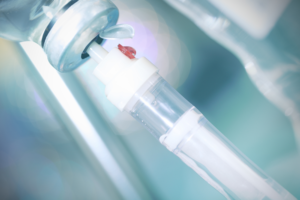Your Satiety Hormone May Hold the Key to Achieving Weight Loss Goals
Leptin Resistance, often referred to as the “satiety hormone,” is an important master hormone your body releases from fat cells to help regulate your energy expenditure. Leptin also crosses the blood-brain barrier to communicate with the hypothalamus in the brain to signal when you are hungry or full.
If leptin is the master hormone that tells you when it is time to stop eating—and leptin is produced by fat cells—more fat cells should equal more leptin and hunger levels should shut down. Unfortunately, in people who are overweight, leptin resistance’s often develops.
When leptin resistance’s develops, leptin signaling is interrupted, so that no matter how much leptin is produced, the brain does not get the message. Instead of interpreting that extra leptin coming from all those extra fat cells as a signal to stop eating, the malfunctioning metabolic and endocrine systems read the flood of leptin as a starvation alert. The result is uncontrollable cravings for food high in fat and carbohydrates to increase fat stores. The master hormone designed to police weight levels becomes at best ineffective.
Correcting leptin resistance can restore hormonal balance and possibly help you to control your appetite and shed stubborn pounds. To schedule a consultation with a qualified healthcare provider in who specializes in leptin resistance, call (832) 532-0050 or contact us online.
What Causes Leptin Resistance?
Leptin resistance usually develops over time due to three primary factors: (1) too little sleep, (2) too much stress and (3) too much of the wrong foods. Other factors that can contribute to its development include:
- Overeating
- High insulin levels
- High triglyceride levels
- Too much sugar, especially high-fructose corn syrup
- Toxin overload
- High stress (and resulting high cortisol levels)
- Yo-yo dieting (alternating starvation with binge eating, especially)
- Too little sun or time spent outdoors
- Too little or too much exercise
- Excessive snacking, especially late-night snacking and snacking on high-fructose, simple carbohydrate, overly processed foods
These factors can damage your endocrine system and metabolic function, leading to leptin resistance. Unfortunately, the very factors that contribute to developing leptin resistance’s can increase and become symptoms of leptin resistance; e.g., overeating leads to leptin resistance, then leptin resistance’s triggers overeating.
Leptin Resistance Symptoms and Diagnosis
How can you tell if you are suffering from leptin resistance? If you are 15 pounds overweight or underweight, your leptin signaling may be out of whack. Primary symptoms of leptin resistance’s include:
- Being overweight
- High leptin levels (Hyperleptinemia)
- High levels of inflammation
- Finding yourself unable to lose weight, no matter how hard you try
- Experiencing uncontrollable food cravings, especially high-fat, high-sugar or “junk” foods
If you suspect you are experiencing leptin resistance’s, your healthcare provider can review your medical history and conduct a physical examination. After assessing your symptoms, a blood test to measure leptin levels can help your healthcare provider to confirm a diagnosis of leptin resistance. Since leptin levels rise and fall, multiple blood tests may be necessary.
Leptin Resistance Diet & Treatment Options
Leptin resistance can be successfully treated with various therapeutic interventions, many of which are diet-related. Following a leptin diet is key to leptin resistance treatment and weight loss. It may be difficulty to control overeating until leptin levels stabilize and proper leptin signaling returns. Controlling the types of foods you eat is the first step, and controlling the amount of food you eat will become easier as you heal your leptin resistance.
An ideal leptin resistance’s diet will involve:
- Increasing the consumption of omega-3 fatty acids and reducing omega-6 fatty acids
- Increasing the consumption of lean protein
- Limiting sugar, high-fructose corn syrup, simple carbohydrates and refined, processed foods
- No snacking between meals and increasing the time between meals
In addition, there are other lifestyle components with are important to consider to combat leptin resistance’s. These include:
- Reducing the stress in your life
- Getting more sleep
- Exercising regularly, particularly focusing on resistance and strength training
- Detoxifying your life (avoid plastics, processed foods, commercial soaps and detergents, dryer sheets, deodorants and cosmetics)
- Talking to your healthcare provider about supplements that may support leptin balance and signaling
If you struggle with weight loss and experience uncontrollable cravings or constant hunger, you may be experiencing leptin resistance. Schedule a consultation with a healthcare provider in today who can evaluate your leptin hormone levels and recommend effective treatment to restore your health and wellbeing. Call (832) 532-0050 or contact us online.



